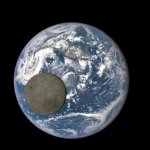Locked without tumbling?
Not really an expansion query, but I'm not really getting the locked into a one sided synchronous orbit, of a satellite like our Moon, and Earth, its primary.
If tidal forces put the brakes on its rotation, shouldn't they have grabbed harder on the heaviest elements present, while the Moon's core was (or may still be) molten?
Would the heaviest elements in the Moon not then drift closer to Earth, while still within the Moon, resulting in gravity density anomalies?
And wouldn't these cause rotational instabilities, similar to a spinning top gradually losing its stable axis?
This seems have happened on Earth, which results in the precession of the equinoxes, but I put that down to Continental drift having shifted mass around, from the globe's original slightly flattened sphere shape.
Not really an expansion query, but I'm not really getting the locked into a one sided synchronous orbit, of a satellite like our Moon, and Earth, its primary.
If tidal forces put the brakes on its rotation, shouldn't they have grabbed harder on the heaviest elements present, while the Moon's core was (or may still be) molten?
Would the heaviest elements in the Moon not then drift closer to Earth, while still within the Moon, resulting in gravity density anomalies?
And wouldn't these cause rotational instabilities, similar to a spinning top gradually losing its stable axis?
This seems have happened on Earth, which results in the precession of the equinoxes, but I put that down to Continental drift having shifted mass around, from the globe's original slightly flattened sphere shape.
Attachments
No, it looks like a topic for a new thread! 🙂Not really an expansion query
When it comes to cosmology, if you are not confused you haven't understood! 😀I'm now totally fully confused.
You're forgetting what was said earlier about the balance between gravity and expansion.How can distance between objects increase re: expansion without them moving from their positions in space?
Galaxies are gravitationally bound together in clusters and each galaxy sits more or less passively in the space around it. Galaxy cluster - Wikipedia
As the emptiness of intergalactic space expands, it carries the galactic clusters further apart. However, the galaxies within a cluster don't move from their relative positions within the cluster - their local space remains unexpanded.
I meant: 'As the emptiness of the intervening space expands...'As the emptiness of intergalactic space expands...
So as space expands, is it getting thinner? Is "local" space more dense? Would there not be some sort of vacuum produced by the intervening space acting on the local space? What about all that other stuff we can't observe...strings, dark matter, etc.?You're forgetting what was said earlier about the balance between gravity and expansion.
Galaxies are gravitationally bound together in clusters and each galaxy sits more or less passively in the space around it. Galaxy cluster - Wikipedia
As the emptiness of intergalactic space expands, it carries the galactic clusters further apart. However, the galaxies within a cluster don't move from their relative positions within the cluster - their local space remains unexpanded.
Not really an expansion query, but I'm not really getting the locked into a one sided synchronous orbit, of a satellite like our Moon, and Earth, its primary.
It's not "locked into orbit". Drifting away.
Why the Moon is getting further away from Earth - BBC News
Sheesh! First he say's "I can see clearly now" and then he comes up with this! Seems like a parallel of sorts, though.
“The Universe is under no obligation to make sense to you.” - Neil deGrasse TysonWhen it comes to cosmology, if you are not confused you haven't understood! 😀
Last edited:
Btw, it's "totallyfully", one word.When it comes to cosmology, if you are not confused you haven't understood! 😀
Not in the Oxford English Dictionary it's not, but it could certainly be useful in describing the four dimensional mathematics that governs spacetime and which trancends being described in simple, everyday words! 🙂
It is when you use the right accent.😉Not in the Oxford English Dictionary it's not, but it could certainly be useful in describing the four dimensional mathematics that governs spacetime and which trancends being described in simple, everyday words! 🙂
I am using the right accent - broad Scots!
However, much of what is said in this thread could be Gaelic for all I know. 😉
However, much of what is said in this thread could be Gaelic for all I know. 😉
Well that's a switch. 😱I wonder what I'll find in the Far East! I'm totallyfully confused! 😕
- Status
- Not open for further replies.
- Home
- Member Areas
- The Lounge
- What is the Universe expanding into..

